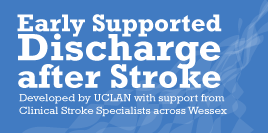 |
Cognitive Impairment |
Recommendations 6.38.1
A. Interventions or patient management should be organised so that people with cognitive difficulties can participate in the treatments and be regularly reviewed and evaluated.
B. Every patient seen after stroke should be considered to have at least some cognitive losses in the early phase. Routine screening should be undertaken to identify the patient's broad level of functioning using simple standardised measures, such as the Montreal Cognitive Assessment (MOCA).
C. Any patient not progressing as expected in rehabilitation should hav a more detailed cognitive assessment to determine whether cognitive losses are causing specific problems or hindering progress.
D. Care should be taken when assessing patients who have a commmunication impairment. Advice from a speech and language therapist should be sought where there is any uncertainty about the individual's cognitive test results (see section 6.20).
E. The patient's cognitive status should be taken into account by all members of the multidisciplinary team when planning and delivering treatment.
F. Planning for discharge from hospital should include an assessment of any safety risks from persisting cognitive impairments.
G. Patients returning to cognitively-demanding activities (e.g. some work, driving) should have their cognition assessed formally beforehand
Sources 6.38.1
A-G. Consensus
 |